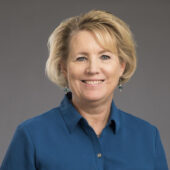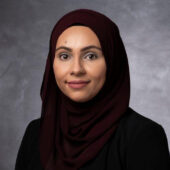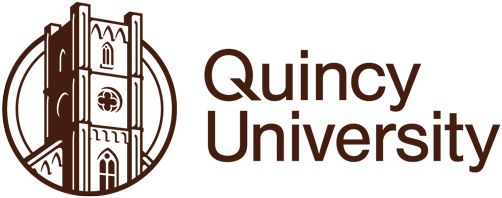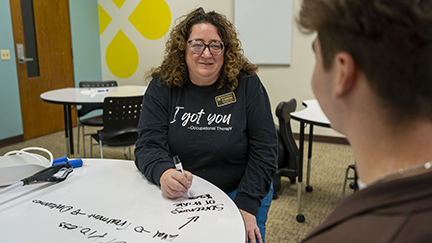Doctor of Occupational Therapy Program
Empowering the Future of Occupational Therapy: A Hybrid Path to Innovative Practice
The Occupational Therapy Doctorate (OTD) Program at Quincy University is dedicated to developing compassionate, servant-leader occupational therapists who are prepared to transform lives through the power of occupation. Our innovative hybrid model blends cutting-edge online learning with immersive, hands-on experiences, equipping students to meet the evolving health and participation needs of individuals, communities, and the occupational therapy profession.
Quincy University has a strong tradition of academic excellence, service, and leadership. Rooted in Franciscan values, we are committed to fostering a learning environment that is student-centered, inclusive, and mission driven.
Choosing the Quincy University OTD program means receiving an education that goes beyond traditional training. We provide:
Impact and Vision
Where passion meets purpose, and education meets impact.
- Graduates of the QU OTD program will emerge as competent, ethical, and visionary leaders who are prepared to shape the future of occupational therapy. Whether working in traditional or emerging practice areas, they will be equipped with the knowledge, skills, and mindset to advocate for clients, advance research, and create inclusive opportunities for participation in meaningful occupations.
“Rooted in Quincy University’s mission of service and servant leadership, I am passionate about advancing the field of occupational therapy and guiding our students as they become compassionate, skilled practitioners.”
Dr. Kristin Haas OTD, OTR/L
Program director and Professor of Occupational Therapy
QU OTD Curricular Threads
Future-ready education, built on values, innovation, and real-world application.
| Occupation-Focused Practice | Leadership & Advocacy | Community Engagement & Service | Lifelong Learning & Development |
| Interventions rooted in meaningful, evidence-based engagement. | Preparation to influence policy, advocate for OT, and drive innovation. | Opportunities to serve diverse and underserved populations. | Skills to adapt, grow, and lead across the professional lifespan. |
Curriculum Overview
Designed for those who want to lead with heart, learn with intention, and practice with purpose.
- Duration: 8 semesters (2 2/3 years), 107 credit hours
- Structure: Full-time, year-round program
- Delivery: Online coursework + on-campus immersion labs
- Format: Each 16-week semester divided into two mini-mesters
Student Learning Outcomes
Graduating change-makers who advance equity, inclusion, and the art of occupation.
 At the end of the OTD program at Quincy University students will:
At the end of the OTD program at Quincy University students will:
1. Develop a robust professional identity aligned with OT core values.
2. Integrate evidence-based and occupation-centered care in interprofessional settings.
3. Engage in ethical, reflective, and client-centered practice.
4. Lead and advocate for community health and occupational justice.
Quincy University Occupational Therapy Faculty
Mentors, Experts, and Leaders Shaping the Future of Occupational Therapy

Kristin Haas OTD, OTR/L

Jaime Garafalo OTD, OTR/L

Paula J. Costello, OTD, OTR/L

Asfia Mohammed, EdD, MOT, OTR

Trevor St. Clair, OTD, OTR/L
Immersive Labs Overview
Hawk OTD Summit Labs
Where hybrid learning meets hands-on mastery—inspired by experience.
At Quincy University, we believe that meaningful learning happens when knowledge is applied in real-world contexts. That’s why our Hawk OTD Summit Labs are a cornerstone of the hybrid OTD experience.
These immersive, in-person labs take place twice per semester on our beautiful Quincy, IL campus and provide students with hands-on training, peer collaboration, and faculty mentorship in a dynamic and supportive environment.
What to Expect
Hands-on learning that transforms knowledge into confident clinical practice.
Each Summit Lab is designed to bring your online coursework to life. During these intensive sessions, you will:
- Apply clinical reasoning through simulation-based and hands-on activities
- Build competence with therapeutic tools, assessments, and interventions
- Engage in team-based learning and interprofessional collaboration
- Receive individualized feedback from experienced faculty and field practitioners
- Strengthen your identity as a future occupational therapist through occupation-centered practice
- Complete team building and service activities
Summit Labs are intentionally sequenced across the curriculum to match the developmental level of the student—from foundational skills to advanced practice and capstone dissemination.
Lab Format
Every detail matters: Immersive design for maximum impact.
Duration: 4 – 8 days per lab experience (held the first week and 7th week of each semester)
Schedule: Full-day immersive learning, typically 8:00 AM – 5:00 PM
Location: Quincy University’s state-of-the-art Health Sciences Labs
Activities: Skill labs, presentations, case-based learning, assistive technology exploration, clinical simulations, entrepreneurship in OT, and more
Faculty Mentorship & Community
Learning Side by Side: Expert guidance in a collaborative, supportive environment.
Our faculty don’t just teach—they mentor, coach, and collaborate. During Hawk OTD Summit Labs, you’ll work side by side with experts in areas such as neurorehabilitation, pediatrics, hand therapy, mental health, and community-based practice. These rich face-to-face interactions help build strong professional relationships and deepen your learning experience.
Planning Ahead
Resources for success—so you can focus on what matters most.
To support your success and confidence in attending Summit Labs, we provide advance resources including:
- Recommended lodging near campus
- Travel and transportation tips
- Sample lab schedules
- Packing lists and attire expectations
- Accessibility information and accommodations guidance
- Local dining and grocery options
- FAQs and student tips
These materials will be available before your first immersion to support smooth and confident planning.
A Transformational Experience
The Hawk OTD Summit Labs are more than just an academic requirement—they are a space for transformation. Here, students build not only technical competence but also the confidence, creativity, and collaboration skills that will carry them forward in clinical practice and leadership.
Clinical Education
Learn in context. Serve with impact. Grow through reflection.
Our program includes approximately 1,000 hours of fieldwork across multiple settings and populations. We prioritize partnerships with rural and underserved communities to ensure students experience the full breadth of OT practice. Students are supported through each fieldwork level by an experienced academic fieldwork coordinator and site fieldwork educators.
Fieldwork Highlights
Build Competence, Confidence, and Compassion—One Fieldwork at a Time
- Four Level I fieldwork placements integrated into didactic learning
- Two 12-week Level II fieldwork rotations
- Focus on reflective practice, occupational justice, and interprofessional collaboration
Doctoral Capstone Highlights
Your vision. Your voice. A project with lasting purpose.
Each student completes a 14-week capstone experience and project focused on an area of passion and practice innovation. Supported by a faculty mentor and a community partner, students develop, implement, and disseminate a project that contributes to the profession and addresses community-identified needs.
Capstone areas may include:
- Program development
- Advocacy and policy
- Education and training
- Emerging practice areas
- Research and scholarship
Students must complete 24 weeks of Level II fieldwork and an individual 14-week capstone experience within 24 months following the completion of the didactic portion of the program. The doctoral capstone experience must be started after completion of all coursework, Level II fieldwork and preparatory activities defined in 2023 ACOTE OTD Standard D.1.3.
Admissions and How to Apply
Your Path Begins Here: Start your journey toward a purpose-driven OT career.
The QU OTD program uses OTCAS (Occupational Therapy Centralized Application Service) for applications.
There are 2 pathways (1) Direct Admit for matriculating freshmen and (2) Standard Admit for students who have earned a bachelor’s degree. Find more information in our Academic Catalog.
Join Us in Making a Difference
Be the Change. Empower Lives Through Occupational Therapy.
Quincy University’s OTD program is more than just an academic pathway—it’s a commitment to excellence, service, and transformation. We invite students, faculty, and community partners to join us in shaping the future of occupational therapy through innovation, leadership, and advocacy.
Contact: occupationaltherapy@quincy.edu
Location: 1800 College Ave, Quincy, IL 62301
Follow us on: need to provide links to these sites
Phone: 217-228-5432
For program leadership, contact:
Dr. Kristin Haas
Professor and Founding Program Director, Occupational Therapy Doctorate Program
The entry-level occupational therapy doctoral degree program has applied for accreditation and has been granted Candidacy Status by the Accreditation Council for Occupational Therapy Education (ACOTE) of the American Occupational Therapy Association (AOTA), located at 7501 Wisconsin Avenue, Suite 510E, Bethesda, MD 20814. ACOTE’s telephone number c/o AOTA is (301) 652-AOTA and its web address is www.acoteonline.org. The program must have a preaccreditation review, complete an on-site evaluation, and be granted Accreditation Status before its graduates will be eligible to sit for the national certification examination for the occupational therapist administered by the National Board for Certification in Occupational Therapy (NBCOT). After successful completion of this exam, the individual will be an Occupational Therapist, Registered (OTR). In addition, all states require licensure to practice; however, state licenses are usually based on the results of the NBCOT Certification Examination. A felony conviction may affect a graduate’s ability to sit for the NBCOT certification examination or attain state licensure.

